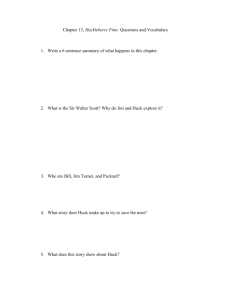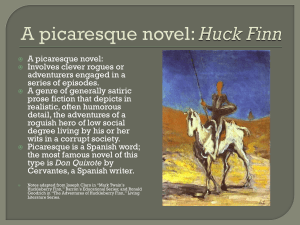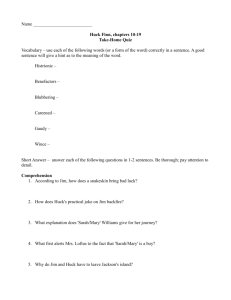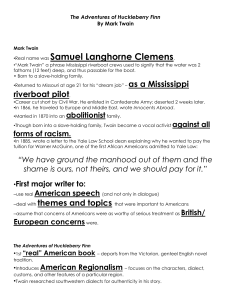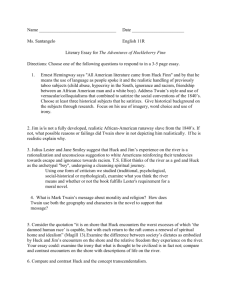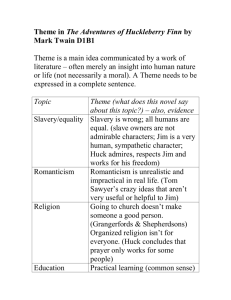Huckleberry Finn Prep
advertisement
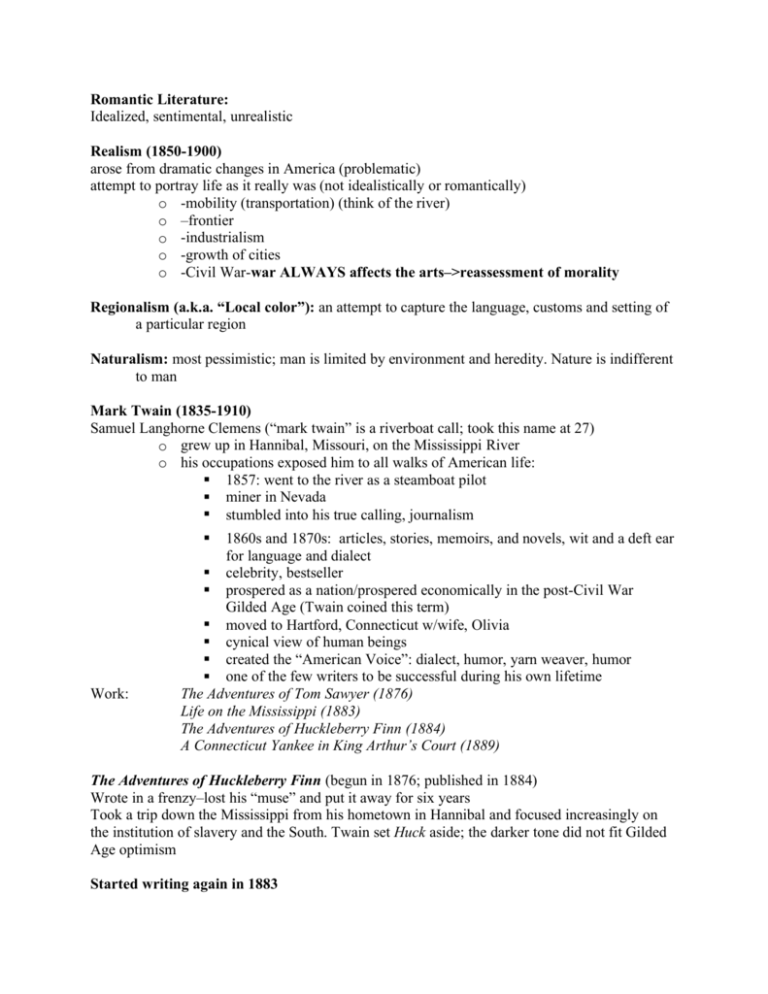
Romantic Literature: Idealized, sentimental, unrealistic Realism (1850-1900) arose from dramatic changes in America (problematic) attempt to portray life as it really was (not idealistically or romantically) o -mobility (transportation) (think of the river) o –frontier o -industrialism o -growth of cities o -Civil War-war ALWAYS affects the arts–>reassessment of morality Regionalism (a.k.a. “Local color”): an attempt to capture the language, customs and setting of a particular region Naturalism: most pessimistic; man is limited by environment and heredity. Nature is indifferent to man Mark Twain (1835-1910) Samuel Langhorne Clemens (“mark twain” is a riverboat call; took this name at 27) o grew up in Hannibal, Missouri, on the Mississippi River o his occupations exposed him to all walks of American life: 1857: went to the river as a steamboat pilot miner in Nevada stumbled into his true calling, journalism Work: 1860s and 1870s: articles, stories, memoirs, and novels, wit and a deft ear for language and dialect celebrity, bestseller prospered as a nation/prospered economically in the post-Civil War Gilded Age (Twain coined this term) moved to Hartford, Connecticut w/wife, Olivia cynical view of human beings created the “American Voice”: dialect, humor, yarn weaver, humor one of the few writers to be successful during his own lifetime The Adventures of Tom Sawyer (1876) Life on the Mississippi (1883) The Adventures of Huckleberry Finn (1884) A Connecticut Yankee in King Arthur’s Court (1889) The Adventures of Huckleberry Finn (begun in 1876; published in 1884) Wrote in a frenzy–lost his “muse” and put it away for six years Took a trip down the Mississippi from his hometown in Hannibal and focused increasingly on the institution of slavery and the South. Twain set Huck aside; the darker tone did not fit Gilded Age optimism Started writing again in 1883 o hopefulness of the post-Civil War years began to fade o Reconstruction: reintegration of the South into the Union as a slavery-free region failing o harsh measures the victorious North imposed only embittered the South o Southern politicians’ effort to control and oppress the black men and women Twain’s personal collapse o sickly wife o lost their first son after just nineteen months o 1891 debt o devoted self to writing Setting of the novel is pre-Civil War Antebellum South (1840s and 50s) St. Petersburg=Hannibal Is Twain a realist as he proposes? Consider the moral decisions and Hamlet-like soliloquizing Genre: o Bildungsroman: a novel of initiation o Picaresque: an episodic novel with a rogue hero o Satire: (conceived as a sequel to TS) work that tries to expose a vice in order to correct it (also uses humor) o Archetypal journey-epic Pay attention to: o the function of the river o the structure of the novel o the characters’ status as outsiders o race Clemens said Tom Sawyer was written for children, but Huck Finn was written for adults. Hemingway said all American literature comes from one book: The Adventures of Huckleberry Finn Controversial since it was published o said to be trashy and vulgar, especially Huck’s language o was pulled from Philadelphia schools o one of the most frequently banned books of all time Point of View: o first person, observant, pragmatic, uneducated youth, naive-provides immediacy and stablishes possibility of irony Huck: Superstition=uneducated, but not stupid; Huck admires Tom Sawyer. Tom: Member of society; a romantic; plays at being rebellious Gang: Vehicle to satirize book learning, religion Pap: uneducated, violent drunk, lowest form of humanity Jim: superstitious, close to nature, folk wisdom, dignity STORY: • Huckleberry is the only character who can’t be domesticated • Contrast and compare between life with Pap and life with Widow and Miss Watson • His refusal to accept what’s socially acceptable makes all forms of love possible for him • He believes that one’s conscience speaks on behalf of society when it conveys what is right • At one point he even says, “This is what comes of me not thinking,” which is his real, natural conscience coming through • This is highlighted in Chapter 14, which brings up the concept (again) of Christians forcing slaves (property) to become practicing Christians, even though that violates the concept of Christianity. • Huck has it backwards in Ch 14; Huck wants to teach Jim the moral of the Solomon story, to which Jim asks in reply, “what good is half a child?” Jim’s point: people who have nothing don’t waste anything Ch 15 Jim is Huck’s surrogate father Huck plays a trick on Jim in the midst of Jim doing risky stuff to help him Huck uses a lie to treat Jim badly; he feels bad about this EPIPHANY: learns a lesson...FROM JIM! EUREKA! Ch 16 • White mist covering Cairo–the passages in and out of the river mist make it all dreamlike, but highlight the idea of how whiteness, a social division, Huck’s being white obstructs his view of Jim as a human being • There’s a paradox of liberation in Huck Finn • Scenes on the river are peaceful and tranquil—free • External forces like prejudices and the accepted social order(river) are unreliable, always changing, and therefore not reliable as a means to develop a moral system How does Huck handle morality? He stays calm, makes up a lie, and doesn’t falter. If his father hadn’t been imperfect, he wouldn’t have been able to rail against others in power later (there’s a reason for everything, that’s why the river keeps going). This is all a game/adventure to him— Huck makes bad decisions with his “friends.”
